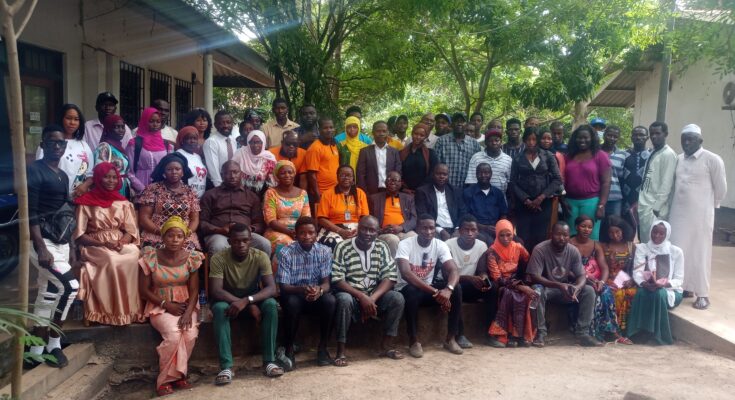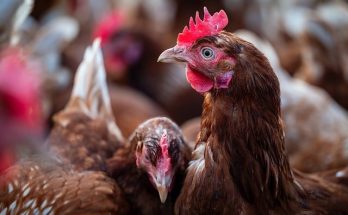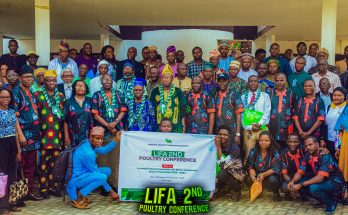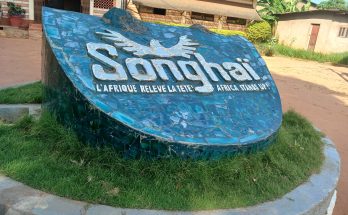The training program on Poultry Health and Nutrition that was sponsored by the Zoetis Foundation was held in The Gambia at two different locations; Gambia College Brikama and Masankonko Town Hall, Lower River Region (LRR) on the 28th and 30th June, 2022 respectively. The Livestock Industry Foundation for Africa (LIFA) put together the program for The Gambia’s poultry farmers in order to facilitate critical advancements in the productivity of the country’s poultry industry.

In attendance were poultry farmers, veterinarians, animal scientists, poultry farmers, students of veterinary medicine, and other stakeholders in the poultry industry of The Gambia. The training programme attracted over 300 poultry stakeholders in The Gambia for the knowledge update on poultry health and nutrition. As the training is ongoing, some stakeholders from other countries participated via the LIFA Facebook page (https://fb.watch/ejX1QS1qBN/).
The training recorded 6.1% veterinarians, 3.4% veterinary students in Brikama, and 4.6% in the second location (Masankonko), with 3.2% veterinary students. Also, 74.1% of farmers attended the training programme in Brikama while 78.8% of poultry farmers attended the training programme in Masankonko. 66.0% males and 34.0% females attended the training programme in the first location, while 62.6% males and 37.4% females were in Masankonko.

Dr. Stephen Adejoro, President and Founder of LIFA, welcomed everyone to the training session and explained how it would improve sustainable growth for livestock livelihoods in Sub-Saharan Africa (farmers and veterinarians). The directors present at the occasion and also some dignified stakeholders addressed the participants present in the training programme to pay attention to the speakers and let them know that the programme is beneficial to them towards the sustainability and profitability of their poultry businesses.
Mrs. Adejoro, LIFA’s Director of Administration, in her remarks informed the audience that LIFA was a nonprofit organization that intended to improve livestock livelihoods in Sub-Saharan Africa. She described the work that LIFA does, including advocacy, project development, research investigation, farmer and stakeholder education, and information sharing, in her speech.
The knowledge update program and the Zoetis Foundation slide show were presented to the attendees by Mr. Lawal, the LIFA Secretary. He went on to explain to the participants that the Zoetis Foundation works to support local communities and those who care for animals, with particular emphasis on expanding opportunities for farmers and veterinarians all over the world. In his presentation, he shows that the program’s objective is to provide face-to-face training to assist local farmers, stakeholders, and veterinarians in developing their professional and entrepreneurial skills.
The Critical Issue Affecting Healthy Poultry Feeds: The Role of Mycotoxin is discussed by Dr. Stephen Adejoro. He told the audience at the beginning of his speech that “No Farmer, No Nation” (relatively). He informed the participants that although the subject may seem weird, the fundamental issue might completely destroy the poultry business. He makes the observation that Nigeria consumes less chicken than the Gambia. Asking the participants about their knowledge of antibiotics, vitamins, and mycotoxin led him to the conclusion that, according to the study undertaken, very few people have contributed financial resources to the management of mycotoxin. Although there are many distinct kinds of mycotoxins, he claimed in his presentation that Aflatoxin, Ochratoxin, T2 toxin, Zearalenone, Nivalenol/deoxynivalenol, and Fuminosin are the ones that are most frequently linked to health problems in cattle, poultry, and people. He referred to the small molecules as Aflatoxin, Octratoxin A, and T2 toxin and the large molecules as Zearalenone, Nivalenol/deoxynivalenol, and Fuminosin.
He explained that field studies had revealed that the majority of mycotoxicoses had subclinical symptoms that made them challenging to diagnose. They can lessen an animal’s capacity for digestion and absorption as well as hinder its immune response to immunization. He added that, according to FAO, mycotoxins infect about 25% of all food globally. Furthermore, according to his presentation, the numerous fungi that cause mycotoxins do not reproduce or form themselves.
According to Dr. Adejoro, a favorable environment is necessary for the production of mycotoxins like Aflatoxin, Fuminoxin, and Zearalenone. He outlined the methods to prevent mycotoxin contamination, including the type of grain used, storage conditions, the buildup of dust and organic material inside feed production equipment, and transportation circumstances. He came to the conclusion that contaminated feed poses a major threat to the immune system’s integrity when it is consumed by chicks or adult birds, which can result in the emergence of resistance and ongoing vaccination failures. In order to reduce disease outbreaks on their farm, Dr. Adejoro emphasized to the farmers the value of biosecurity.
Dr. Niyi Bankole, the Technical Manager for West Africa at Zoetis, gave the second presentation on Gut Health Maintenance in Poultry. He began by explaining to the participants what he means by “gut”: its function and growth; the detrimental factors that contribute to poor gut health; the monitoring of gut health and health management. He stated that over 70% of the avian immune tissues were stored in the stomach (GALT & MALT). He stressed that healthy development and FCR depend on acquiring and maintaining a balanced gut flora, which in turn depends on the appropriate growth of gut tissues.
He stated in his presentation that the stimulation provided by the gut microbial is a crucial component of villi formation and that conditions like cold stress and inadequate feed/water supply might hinder villi development. He cited infectious factors such as bacteria, parasites, poor feed quality and management, and antinutritional substances as the main reasons for poor gut health. Participants were informed that poor growth rates, flock uniformity, moist feces, wet litter, feed passage, and foamy caecal droppings are all signs of poor gut health. The following was how the participants were given the gut score:
Is there mucus present?
- In the duodenum mucus is common Yes (Good)
- In jejunum and ileum you shouldn’t see mucus Yes (NOT GOOD)
- Is there feed passage? Yes (NOT GOOD)
What do the Caeca look like?
- Presence of Gas Not extremely bloated
- Consistency Muscle and content firm with muscle tone
- Colour Pinkish
In his closing remarks, he mentioned the different aspects of gut management that participants should concentrate on in their closing remarks, including oral tolerance, healthy eating, coccidiosis control, gut microbiota modulation, and effective immunization procedures and monitoring.
Mr. Basiru Jatta from the Gambia’s Department of Livestock Services delivered the third lecture. He talked about the Gambia’s poultry industry in general. In The Gambia, there are 937,951 chickens overall, according to NLC data from 2016, and there are extensive, semi-intensive, and intensive poultry systems in use. According to his assessment, there are 60 inactive farms and 89 total active farms, for a percentage of 59.73 percent to 40.27 percent, respectively.
Five imported feed mills in The Gambia produced 2072 tons of feed in 2020, according to the department, while three indigenous feed mills produced 4727.5 tons. In addition, it was mentioned that seven companies imported a total of 710,020 chicks to The Gambia in 2020. He continued by telling the participants that the total amount of local eggs produced in 2019, 2020, and 2021 was 10.81, 581.3, and 89.3 metric tons, respectively.
In 2019, 2020, and 2021, the metric tons of eggs imported are 339684.8, 302539, and 476250.9, respectively. Additionally, for the three consecutive years under consideration, local production of chicken was 121.98, 313 and 399 metric tons, whereas imports were 1784216, 1579220, and 2051830 metric tons.
He noted the difficulties facing the poultry industry, including the lack of a policy, access to raw materials, a feed analysis laboratory, high input costs, the advent of new diseases, the lack of agricultural lending facilities, and the actors’ limited engagement/cooperation with one another. The lecture was completed with recommendations, including the construction of a feed analysis laboratory, the marketing of the local chicken, and support for consuming local goods.
The participants were given the opportunity to share their thoughts and comments on the training program during the question-and-answer session. From the comments received from the training program, it was stated that the majority of participants appreciate the opportunity of organizing the programme in their country. Also, it was expressed by the participants that they desire more time for the training programme. A group photograph was taken at the end of the training program.
In her capacity, LIFA appreciates the support of the Zoetis Foundation for the initiatives to enhance the livestock industry through the direct delivery of lectures to farmers and significant stakeholders. Appreciation goes to AGRITECH Enterprise and Livestock Services of the country for their huge support for making the program a success. LIFA is grateful for their assistance.
LIFA will continue to be proactive in organizing trainings for Livestock Farmers/Stakeholders towards improving the Livestock Industry in Sub-Sahara Africa. We are available for collaborations in areas that may require education, training, advocacy, awareness and policy implementation.

















































Assalaam O’ Alaikum
Hi
I hope you are well. I am Shahid Javaid- Australian Citizen since 2001. I really liked your whole activities at this web site.
Basically, I have my Post-Graduation in Poultry Husbandry (MSc. Hons. with distinction, and BSc. Hons. Animal Husbandry) from Pakistan and in addition 02 Years IT. Diploma from Australia. Actually I have very extensive Poultry Teaching (Online and Face to Face), Training and Data Collection experience in field of Poultry Science, Production and Management (23 Years) along with IT. Teaching and Support in Australia (2.5 Years). Also i used to manage Teachers Courses and teaching schedules, and Poultry related all management ‘Curriculum Development’ in the institution. Based on my keen interest and sound experiences in domain of Poultry, please may you help me finding a ‘Poultry teaching or people, farmers training’ job in certainly beautiful Gambia with kind people as you !
Please, CV. can be sent if you are interested at your email. Waiting for a quick and sure pretty positive response from your office.
Best of Regards!
Send you proposal or Cv to lifango48@gmail.com
Assalaam O’ Alaikum
Hi
I hope you are well. I am Shahid Javaid- Australian Citizen since 2001. I really liked your whole activities at this web site.
Basically, I have my Post-Graduation in Poultry Husbandry (MSc. Hons. with distinction, and BSc. Hons. Animal Husbandry) from Pakistan and in addition 02 Years IT. Diploma from Australia. Actually I have very extensive Poultry Teaching (Online and Face to Face), Training and Data Collection experience in field of Poultry Science, Production and Management (23 Years) along with IT. Teaching and Support in Australia (2.5 Years). Also i used to manage Teachers Courses and teaching schedules, and Poultry related all management ‘Curriculum Development’ in the institution. Based on my keen interest and sound experiences in domain of Poultry, please may you help me finding a ‘Poultry teaching or people, farmers training’ job in certainly beautiful Gambia or Tanzania with kind people as you !
Please, CV. can be sent if you are interested at your email. Waiting for a quick and sure pretty positive response from your office.
Best of Regards!